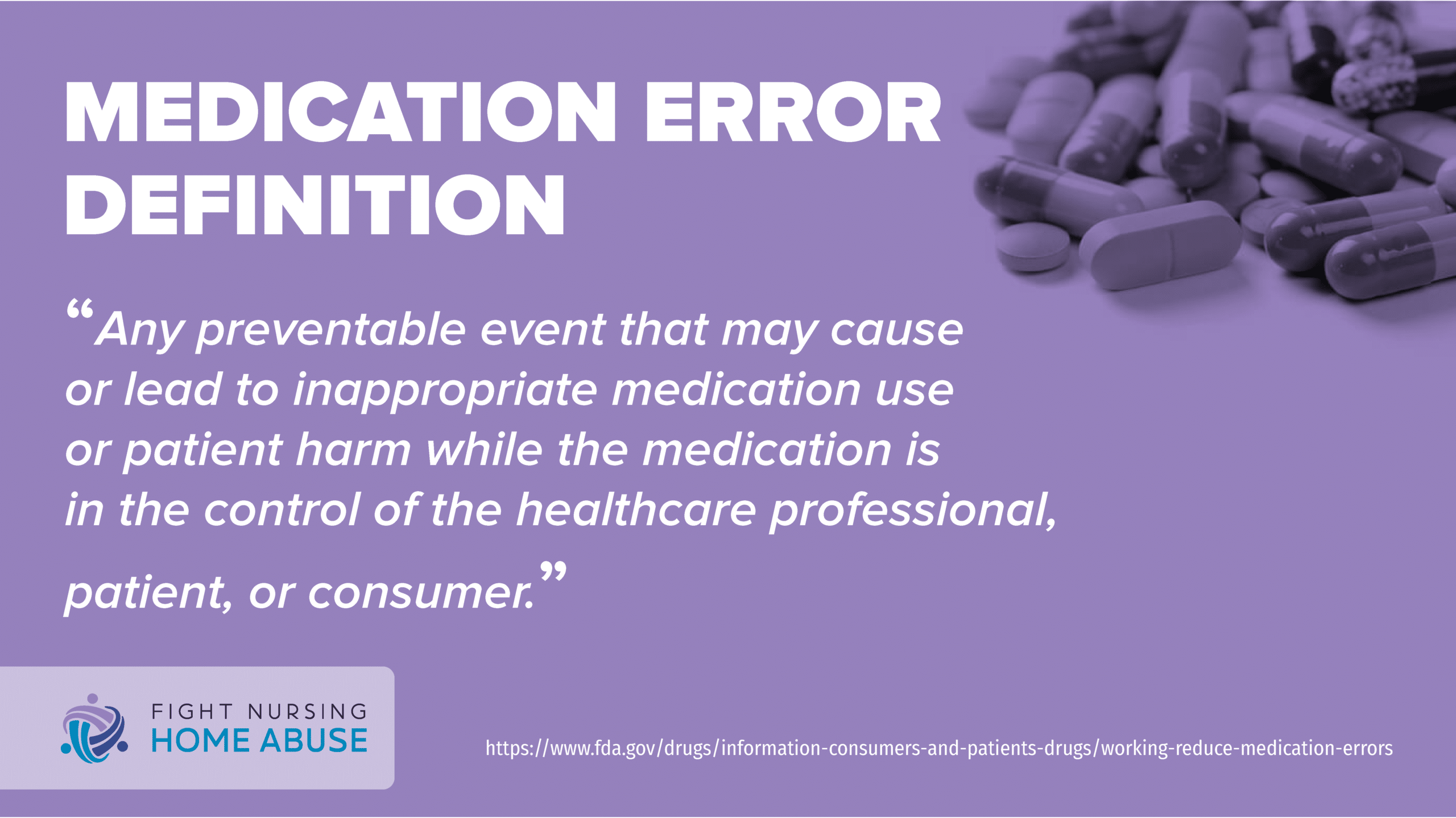Overmedicating or Wrong Medication

One would hope that properly managing patient medication is a high priority in nursing homes. In quality, well-run nursing homes, staff members ensure that the proper procedures are being implemented when residents are given their medications. Unfortunately, however, overmedicating and wrong medication errors occur frequently in poorly managed, understaffed and poorly operated nursing homes.
Statistics show that as we age, the chances of us needing prescription medication increases. Although most diseases can happen at any age, cancer, heart disease and stroke are the three biggest killers of the elderly. All three diseases require numerous medications. In addition, high blood pressure, diabetes, Parkinson’s disease and Alzheimer’s disease are common diseases in which doctors prescribe medication. In fact, according to AARP, Americans ages 75 and older take on average, over 11 different drugs over the course of a year.
Studies report that while seniors comprise 13% of the U.S. population, they account for almost 35% of all filled prescriptions. Close to 90% of all Medicare beneficiaries use prescription drugs.
Overmedicating or Wrong Medication Errors
Wrong Medication
Abuse of this type can take several forms. In cases where the nursing home is understaffed, overworked nurses may make mistakes by becoming careless. As a result, one resident may be given the wrong medication. The ramifications are serious. If one patient receives someone else’s high-blood-pressure medication instead of her own diabetic medication, not only are both patients failing to be treated for their current medical conditions, but they also run the risk of dangerous interactions and side effects from drugs they’re not supposed to be taking.
Furthermore, some drugs require steady, consistent use in order to be effective and safe. Skipping doses may render the medication ineffective. On average, a typical nursing home resident takes several different types of pills per day. Understaffed and overwhelmed staff members, unfortunately, may get medications mixed up when dealing the sheer amount of medication that residents need on a daily basis.

Overmedicating and Chemical Restraints
Although the previously mentioned scenario is certainly dangerous, getting patient medications confused is typically unintentional abuse. This of course, is still illegal and is considered a form of nursing home abuse. But there are also more sinister acts where staff members purposely overdose residents. Unscrupulous staff members and caregivers may intentionally give patients drugs they have not been prescribed or higher doses of ones they have in order to subdue them.
In fact, according to a 2014 report from the Centers for Medicare and Medicaid Services (CMS), 83% of atypical antipsychotic drug use in the U.S. is among nursing home residents.
In California alone, the numbers are even higher, with at least 25% of all statewide nursing home residents receiving more than the required amount. Florida may be the worst example, however, with a CMS study revealing that a shocking 71% of the state’s nursing home residents were being overdosed with antipsychotic medications.
Even more disturbing is that in many cases, immoral administrators may condone or even encourage such behavior if it helps to subdue what they consider unruly and disruptive residents.
Is Overdosing Common?
Unfortunately, overdosing residents with prescribed medication is reported to be a common problem in U.S. nursing homes. Since physically restraining patients with belts and straps is now illegal except in rare situations, some experts suggest that drugs are being used instead. When nursing home staff feel the need to control difficult patients, they turn to drugs.
While it is not legal to use drugs to chemically restrain a patient, such practices are acknowledged to be widespread. The result can be a serious decrease in the resident’s quality of life or can be deadly. At least 15,000 nursing home patients die each year because of unnecessary use of antipsychotics.
Watch for Signs of Nursing Home Abuse
If your loved one’s health or behavior changes erratically, if he or she develops unusual physical symptoms, or if he or she grows more lethargic or confused, medication-related nursing home abuse may be at fault. If possible, visit the nursing home when nursing staff is administering medications. See what measures nurses use to ensure that patients receive the correct medication or dose. Ask to see a log of the drugs given to your loved one. And if you do suspect that your loved one has been improperly medicated, ask a doctor to run tests.
A common fact is that a lot of nursing home abuse incidents go unreported. Consequently, it’s imperative for loved ones to watch out for the warnings signs that something is wrong. Typical side effects and warning signs of overdosing residents consist of:
- Unusual Fatigue and Exhaustion
- Disorientation
- Unusual Withdrawal from Family and Social Visits
- Unexplained Medical and/or Physical Complications
- Oversleeping and/or Taking Frequent Naps
- Easily Confused and Forgetful
- Acting “Zombie-like”
Furthermore, you should contact a nursing home abuse lawyer to discuss the problem and your legal rights.
Getting Legal Help
If your loved one has been victim to any form of medication-related nursing home abuse, an experienced nursing home abuse lawyer can help you get the justice you and your loved one deserves.
At Fight Nursing Home Abuse, our nursing home abuse lawyers have helped numerous victims go on to receive maximum compensation for abuse and neglect. Call us today and let our team help you as well. For a FREE consultation, call 1-866-548-9636. You can also request more information or a consultation by filling out our online form.


